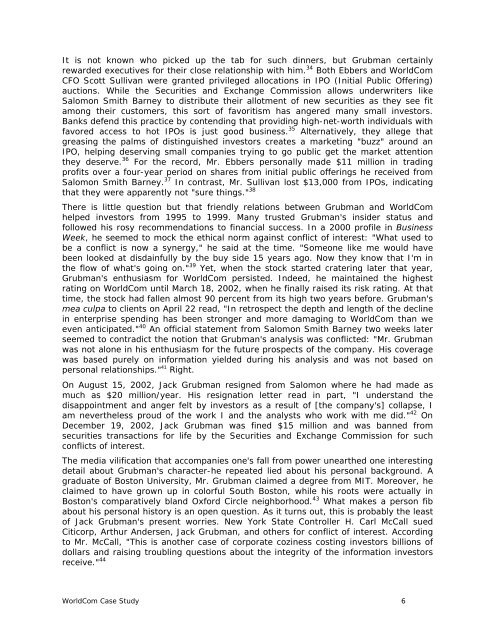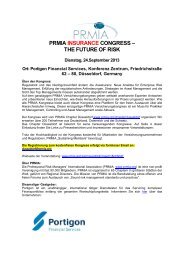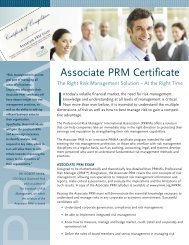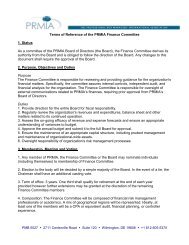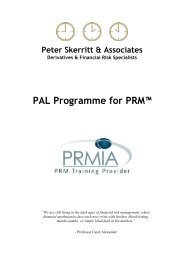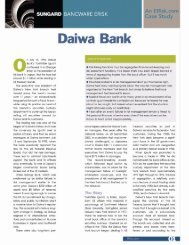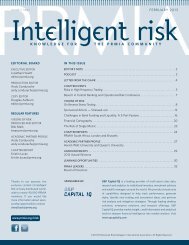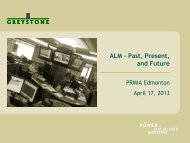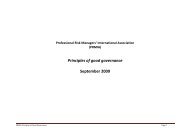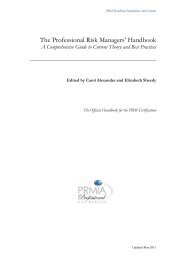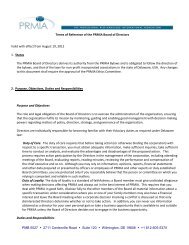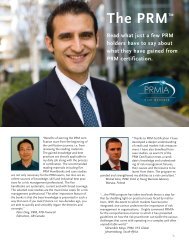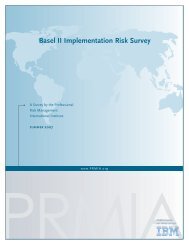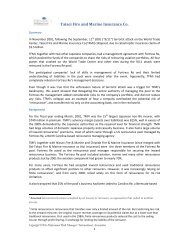WorldCom Case Study1 - PRMIA
WorldCom Case Study1 - PRMIA
WorldCom Case Study1 - PRMIA
You also want an ePaper? Increase the reach of your titles
YUMPU automatically turns print PDFs into web optimized ePapers that Google loves.
It is not known who picked up the tab for such dinners, but Grubman certainly<br />
rewarded executives for their close relationship with him. 34 Both Ebbers and <strong>WorldCom</strong><br />
CFO Scott Sullivan were granted privileged allocations in IPO (Initial Public Offering)<br />
auctions. While the Securities and Exchange Commission allows underwriters like<br />
Salomon Smith Barney to distribute their allotment of new securities as they see fit<br />
among their customers, this sort of favoritism has angered many small investors.<br />
Banks defend this practice by contending that providing high-net-worth individuals with<br />
favored access to hot IPOs is just good business. 35 Alternatively, they allege that<br />
greasing the palms of distinguished investors creates a marketing "buzz" around an<br />
IPO, helping deserving small companies trying to go public get the market attention<br />
they deserve. 36 For the record, Mr. Ebbers personally made $11 million in trading<br />
profits over a four-year period on shares from initial public offerings he received from<br />
Salomon Smith Barney. 37 In contrast, Mr. Sullivan lost $13,000 from IPOs, indicating<br />
that they were apparently not "sure things." 38<br />
There is little question but that friendly relations between Grubman and <strong>WorldCom</strong><br />
helped investors from 1995 to 1999. Many trusted Grubman's insider status and<br />
followed his rosy recommendations to financial success. In a 2000 profile in Business<br />
Week, he seemed to mock the ethical norm against conflict of interest: "What used to<br />
be a conflict is now a synergy," he said at the time. "Someone like me would have<br />
been looked at disdainfully by the buy side 15 years ago. Now they know that I'm in<br />
the flow of what's going on." 39 Yet, when the stock started cratering later that year,<br />
Grubman's enthusiasm for <strong>WorldCom</strong> persisted. Indeed, he maintained the highest<br />
rating on <strong>WorldCom</strong> until March 18, 2002, when he finally raised its risk rating. At that<br />
time, the stock had fallen almost 90 percent from its high two years before. Grubman's<br />
mea culpa to clients on April 22 read, "In retrospect the depth and length of the decline<br />
in enterprise spending has been stronger and more damaging to <strong>WorldCom</strong> than we<br />
even anticipated." 40 An official statement from Salomon Smith Barney two weeks later<br />
seemed to contradict the notion that Grubman's analysis was conflicted: "Mr. Grubman<br />
was not alone in his enthusiasm for the future prospects of the company. His coverage<br />
was based purely on information yielded during his analysis and was not based on<br />
personal relationships." 41 Right.<br />
On August 15, 2002, Jack Grubman resigned from Salomon where he had made as<br />
much as $20 million/year. His resignation letter read in part, "I understand the<br />
disappointment and anger felt by investors as a result of [the company's] collapse, I<br />
am nevertheless proud of the work I and the analysts who work with me did." 42 On<br />
December 19, 2002, Jack Grubman was fined $15 million and was banned from<br />
securities transactions for life by the Securities and Exchange Commission for such<br />
conflicts of interest.<br />
The media vilification that accompanies one's fall from power unearthed one interesting<br />
detail about Grubman's character-he repeated lied about his personal background. A<br />
graduate of Boston University, Mr. Grubman claimed a degree from MIT. Moreover, he<br />
claimed to have grown up in colorful South Boston, while his roots were actually in<br />
Boston's comparatively bland Oxford Circle neighborhood. 43 What makes a person fib<br />
about his personal history is an open question. As it turns out, this is probably the least<br />
of Jack Grubman's present worries. New York State Controller H. Carl McCall sued<br />
Citicorp, Arthur Andersen, Jack Grubman, and others for conflict of interest. According<br />
to Mr. McCall, "This is another case of corporate coziness costing investors billions of<br />
dollars and raising troubling questions about the integrity of the information investors<br />
receive." 44<br />
<strong>WorldCom</strong> <strong>Case</strong> Study 6


